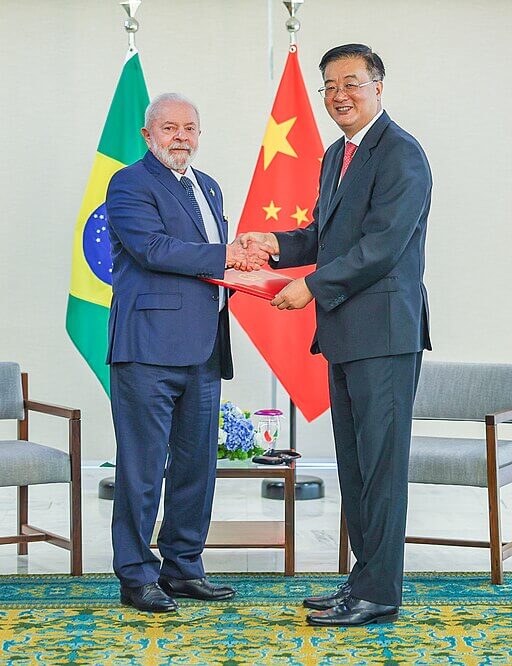China and Brazil expand cooperation in various fields
Photo: Brazilian President Lula da Silva with Zhu Qingqiao, Chinese Ambassador to Brazil. Source: Wikimedia Commons
On January 20, Chinese Foreign Minister Wang Yi and his Brazilian counterpart Mauro Vieira led the 4th China-Brazil Comprehensive Strategic Dialogue at the Foreign Ministers’ Level in Brasilia. During the meeting, both sides pledged to strengthen the synergy of their development strategies and expand cooperation in emerging areas.
Wang highlighted the resilience of Sino-Brazilian relations in the face of an ever-changing international landscape. He stressed that in the ten years since the launch of the comprehensive strategic dialogue, mutual trust has grown, communication has deepened and bilateral cooperation has shown broad prospects. He emphasized the importance China attaches to its ties with Brazil and Latin America, supporting Brazil’s efforts in national development and revitalization.
Vieira praised the progress in bilateral ties, attributing it to the strong mutual trust and strategic orientation of the leaders of the two countries. He described the cooperation as mutually beneficial and far-reaching, contributing significantly to the development of both nations.
Both sides agreed to strengthen high-level exchanges and build on existing mechanisms to promote cooperation. They pledged their mutual support in modernization tailored to their respective national conditions and explore the synergy between China’s Belt and Road and Brazil’s reindustrialization.
The agreement included enhancing cooperation in traditional sectors such as agriculture, energy minerals and infrastructure, as well as expanding into emerging fields such as interconnectivity, healthcare, green development, digital economy, clean energy and artificial intelligence. Ahead of the 50th anniversary of diplomatic relations, the two sides agreed to hold joint celebrations, signed an agreement on mutual visa facilitation and expressed their willingness to strengthen strategic coordination in international forums such as the UN, G20, BRICS and WTO. They also pledged to promote political solutions to global problems and strengthen China-Latin America cooperation to promote peaceful development and regional unity.
Main source:
Other related sources:

